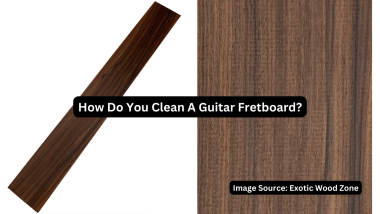How Do You Clean A Guitar Fretboard? ( lemmy.world )
As I sit in my small workshop, surrounded by the smell of wood and the soft sound of my assistant tuning a guitar, I can't help but reflect on the memories that this workshop holds. Memories of creating, repairing, and caring for some of the most beautiful and cherished instruments in the city.
Image Source: Exotic Wood Zone
My name is Lucas and I am a luthier – a maker of stringed instruments. I have been practicing this craft for over fifty years and it has been my passion ever since I was a young boy. I still remember the first time I saw a guitar being played at a local fair. The sound of the strings and the way the musician's fingers effortlessly glided along the fretboard captured my heart and I knew right then that I wanted to be a part of this world.
Years of learning and mastering the art of instrument making have brought me to this point – owning my own workshop and being sought after by musicians far and wide. And one thing that I have always taken great pride in is not just creating beautiful instruments, but also ensuring their longevity by taking proper care of them.
Which brings me to the topic at hand – how do you clean a guitar fretboard?
The fretboard is the part of the guitar that holds the strings and allows for different notes to be played by fretting or pressing down on the strings in various positions. As such, it is essential to maintain its cleanliness and condition for optimal sound and playing experience.
Image Source: Exotic Wood Zone
The first step in cleaning a guitar fretboard is to remove the dirt and grime that has accumulated over time. To do this, I use a soft, clean cloth and a small amount of mineral oil. I gently rub the oil onto the fretboard, being careful not to get any on the body or strings of the guitar. The oil helps to loosen the dirt and grime, making it easier to remove.
Next, I use a fretboard brush to gently scrub the fretboard. This brush has soft bristles that can reach between the frets and remove any stubborn dirt. I make sure to brush in the direction of the frets, not against them, to avoid damaging the wood.
Image Source: Exotic Wood Zone
Once the fretboard is scrubbed clean, I use a clean, dry cloth to wipe away any excess oil and dirt. This step is crucial as it helps to prevent the buildup of any remaining grime or oils, which can lead to a dull and sticky fretboard.
After wiping away the excess oil, I let the fretboard air dry for a few minutes while I move on to the next step – conditioning. I make my own guitar conditioner using equal parts beeswax, linseed oil, and carnauba wax. This mixture not only conditions the wood, but also helps to protect it from moisture and changes in temperature.
Image Source: Exotic Wood Zone
Using a small cloth, I apply the conditioner in a circular motion, covering the entire fretboard. Then, I leave it to sit for about ten minutes before gently rubbing off any excess with a clean, dry cloth. This step not only conditions the wood but also brings out its natural beauty, giving the instrument a glossy finish.
Finally, I polish the frets using a metal polish and a microfiber cloth. This step is optional, but it adds an extra shine to the frets, making them look like new. I make sure to polish only the frets and avoid getting any polish on the wood of the fretboard.
Image Source: Exotic Wood Zone
And there you have it – a clean and well-conditioned fretboard. But this process didn't come without its challenges. When I was just starting out as a luthier, I had a client who brought in a guitar with a heavily soiled fretboard. I followed the standard cleaning process, but to my horror, the fretboard ended up with a hazy, dull appearance.
After some research and experimenting, I discovered that the guitar may have been made of a different type of wood that reacted poorly to the mineral oil. After apologizing to my client and offering to clean the fretboard once again with a different solution, I learned a valuable lesson – every guitar is unique and requires individualized care.
Image Source: Exotic Wood Zone
As I look around my workshop at the instruments waiting to be repaired and the ones ready to be played, I can't help but feel grateful for the opportunity to create and care for these beautiful instruments. And for me, that includes not only making them but also ensuring that they receive the proper care and maintenance, like a clean and well-conditioned fretboard, so that they can continue to produce beautiful music for years to come.
